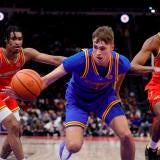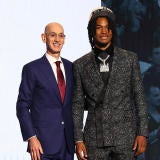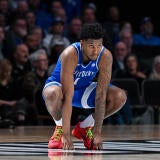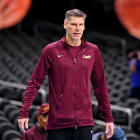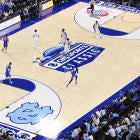SAN ANTONIO -- The eight of them gathered in Porter Moser's spacious suite at the Westin on Wednesday night. Among this motley crew of coaches were middle-aged men you might have never heard of: John Gallagher from Hartford, Mike Martin from Brown, Chris Harriman from New Mexico, Dave Pauley from the University of Sciences in Philly.
A clan of coaching eccentrics from around the country, none of whom has found the kind of mainstream success that college basketball and the month of March sometimes afford for the more fortunate but not always the more deserving. Until two weeks ago, Moser was like them.
In most ways, he still is.
"He's in the Final Four, his pictures are on the wall here ... and a year ago he's trying to win in the (Missouri Valley Conference)," Gallagher said. "Is this actually happening?"
The buddies traded old stories as they swigged beers and munched on wings and calamari. At some point, time had come for a toast. With Moser's Loyola-Chicago team in the midst of an all timer of an NCAA Tournament run, glasses were due to be raised. Moser -- man of the hour, king of the week and coach of the month -- spoke up.
"To David Patrick for getting his first head coaching job," he said.
Steve Shields, an assistant at Southern Miss who's known Moser for almost 30 years, wasn't surprised by Moser's words for Patrick, who just got his gig at UC Riverside earlier this month. Nobody else in the room was either. As he always has, Moser refused to make it about himself.
"Deflecting off his shining moment," Shields said.
To this point, Loyola-Chicago is an amazing story but not a one-of-a-kind story. Moser's path to the Final Four, however, is. We have seen Cinderella teams seeded 11th make it this deep into the NCAAs before (see: George Mason and VCU). Moser, though, has done the unprecedented. Never before had a coach gone so long until making his first NCAA Tournament (14 seasons) and in doing so made the Final Four in his first trip to the Big Dance.
"As the nation's gotten to meet him, that's what we saw when we met him at 18 years old," said Todd Eisner, Winona State coach and a college friend of Moser's. "Outgoing, enthusiastic, passionate. He always played with an edge, but always felt like he belonged. This weekend's the fruition of all those days, months, years of work."
Talk to those who know Moser best and they'll swear he was owed this glory. Talk to those who barely know him at all and they could claim the same. Guys like John Giannini (La Salle), Wes Flanigan (Little Rock) and Scott Cross (UT Arlington): all three were fired this month, two of them within the past week. Moser took the time to get their numbers from other people, call them and spend 15, 20, even 30 minutes on the phone with them (and there may be more), just to send encouragement and reassure them that things can change for the better.
"That's Porter Moser, it's always about someone else," Gallagher said.
Moser knows. He's been there.
In 2007 he was forced out after four uneven years at Illinois State. He went 51-67 there and never finished better than sixth in the Missouri Valley. It was a 180 from Moser's time at Little Rock, when he was hired in 2000 at the age of 29 -- making him the youngest head coach in Division I -- and parlayed three successful (non-NCAA Tournament) seasons there into the ISU job. The ISU flameout hurt him to the point where one athletic director in the MAAC passed on even interviewing him.
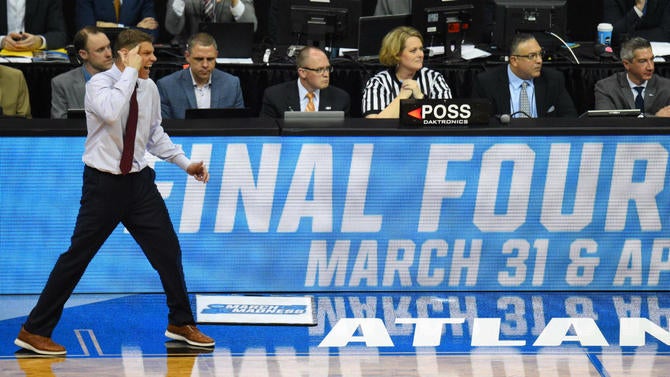
"That's about as down as I've ever seen him," Eisner said.
Eisner and Moser arrived together at Creighton in 1986, when Moser -- a walk-on -- had the same spiky hairstyle at 18 he's still sporting at 49. After the Ramblers' win over K-State in the Elite Eight, Eisner and Moser waxed on the past and present from Moser's hotel room on the 16th floor of the Hyatt in downtown Atlanta.
"The best thing that ever happened in your career was getting fired at Illinois State," Eisner told Moser.
"You're 100 percent correct," Moser said.
The Illinois State debacle wound up being the low point of his career that changed his life. Moser never lost his trademark enthusiasm or passion, even when his coaching future seemed bleak.
"Adversity doesn't have to define you," Moser said. "Some of the worst things that's happened in my life, starting at a young age, some of the best things have followed."
What followed was an unexpected opportunity to work for Rick Majerus at Saint Louis in 2007. During those four seasons and beyond, Moser went through what he calls a "competitive reinvention process." Through this, he became a different coach on the floor and an even more connected one in the business. He refused to let failures affect his professional course. Working for Majerus, who could be cantankerous and brutal with his players, only made Moser more affable.
"It's not common for a person to be as well-liked in this profession as Porter is," Harriman said. "A profession full of people who can be cross -- you know how it is with guys and recruiting. I think you'd have a hard time finding anybody that dislikes Porter and doesn't respect him on any level."
Ask those who talk to him even only occasionally, and they'll swear to you this had to happen for Moser. The universe was going to bend his way, and now it has -- fast and deservingly. Harriman is a prime example. Majerus made Harriman endure two five-day interview periods when the then-young assistant was trying to get his first Division I position. He didn't think he had a shot to join a legend. But Moser, who was promoted to associate head coach after one season as an assistant, had Majerus' trust as much as almost anyone who worked for the famously aberrant coach.
I hope there is a great sports bar in heaven and Rick Majerus is watching this incredible coaching display by his apostle Porter Moser. @RamblersMBB @SLU_Billikens pic.twitter.com/mHC44HdTUk
— Frank Cusumano (@Frank_Cusumano) March 24, 2018
"Porter's all energy, a guy that had been doing it for a long time and was willing to kind of fight for me to come on staff with him," said Harriman, who became an assistant coach at Nebraska and now New Mexico. "Coach Majerus told me at a later date that Porter was the key thing with hiring me."
Last summer, when Harriman was uncertain of his future at New Mexico after a coaching change, Moser called him daily.
"And now he plays in the Missouri Valley conference championship, they win, I call him 90 minutes after and he picks up the phone, 'Hey, Harri,'" Harriman said. "What? He's oblivious to all that craziness when it comes to people that are close to him. He'll do anything in the world for you. I owe everything I have in this profession to Porter."
There are more similar anecdotes, like this one from Gallagher: "Porter saved our season."
Gallagher coaches at Hartford, a program almost 900 miles from Loyola-Chicago and one that has never made the NCAA Tournament. He's never been on staff with Moser, never worked with him in any capacity. The two got to know each other best while sharing a rental car in Greece a few years ago.
So then there's this.
"We're 3-6, I get a phone call," Gallagher said. "We're dead in the water. It's Porter. He spends two hours on the phone with me. We had lost three of four games in the last 30 seconds, and he just paints a picture like an artist, and I mean it. 'You got this thing right where you want them, man. You're in a perfect spot.' He's got his team, he's trying to coach his team. And I can remember we beat Rutgers at Rutgers. He texted me at 9:01, right after the game, and said, 'That's what I'm talking about.' I said, 'Three weeks ago you gave me the best 90-minute talk anybody's given me.' He replied, 'We need to be here for each other.'"
Hartford went on to win 16 more games and tallied its highest win total in a season since the early 1970s. Gallagher got a contract extension.

While in Atlanta for the regionals, Gallagher, Martin, Eisner and a horde of Moser's friends filled up the seats behind the Ramblers bench. Close to 100 people in the Porter posse. All there to see Porter Moser's moment finally happen.
"I said to Mike Martin, the reason this is a different story is because everybody here feels like they're playing in the Sweet 16," Gallagher said. "And now everyone feels like they're in the Final Four because Porter makes you feel that way. This guy's the connector of all coaches. I've met so many coaches from all over because of Porter."
Harriman introduced Gallagher to Moser at Gibson's Steakhouse in Chicago almost five years ago.
"I feel like I've known him since I was 10 years old," Gallagher said. "And when you meet the Loyola-Chicago coach, no offense, you don't feel like he's one day going to the Final Four. All these coaches that know him well, we've made it with him. For the little guy, for the guy that does it right, that has integrity, that doesn't cut corners, that doesn't do anything shady."
On Friday morning here in San Antonio, Eisner had barely wiped the sleep out of his eyes when he got a call from his old friend. In the years since graduating at Creighton together, Eisner and Moser never wound up sharing a bench. They never coached together. So the Final Four is always their time to catch up. This is the first time in 26 years they didn't attend the Final Four together. Usually the Friday-after call was a catchup on the fogginess from the night before, to recap a night at a hole-in-the-wall bar that set the scene for catching up and having a few few pops. This year, obviously, Moser could not partake.
"He ruined it this year," Eisner joked.
But Moser still made the call, clear-eyed and full of spirit.
"I've coached almost 700 games, and I don't know if I've ever been more excited for a game," Eisner said.
Saturday night will offer up another chance for the NCAA Tournament to give the world of sports one of its best stories ever. But there's never been a story like Porter Moser's. He took the long valley-way here, enduring seven sub-.500 seasons and enduring three rebuilding jobs in the process.
Now he's left the gullies and crawled through the desert of NCAA Tournament shutouts to finally make it after 14 years. Moser's found water, an oasis in the spring heat of southern Texas. Behind him is a village of mostly unknown coaches, and friends and family members, who are rooting for the greatest college basketball ending ever to be authored by a man who'd just as soon give that glory away to someone else.





